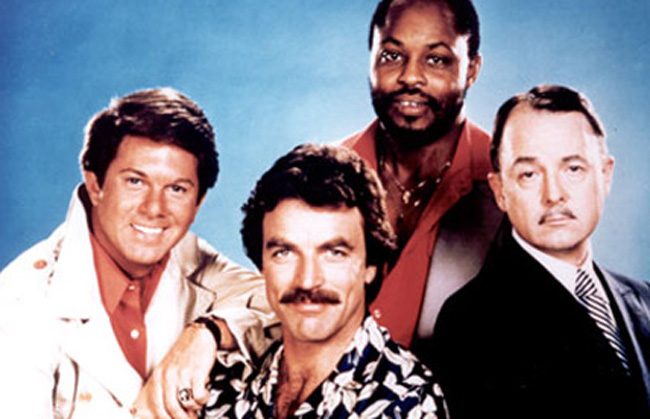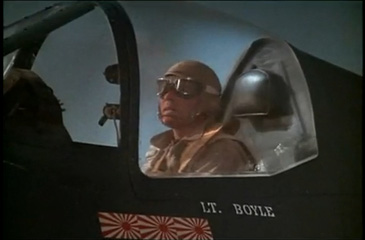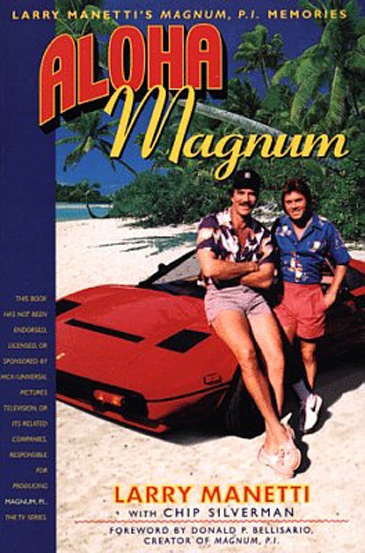CHICAGO – In anticipation of the scariest week of the year, HollywoodChicago.com launches its 2024 Movie Gifts series, which will suggest DVDs and collections for holiday giving.
Interview With Larry Manetti: Memories of Tom Selleck’s ‘Magnum P.I.’
CHICAGO – Where would Thomas Sullivan Magnum had been without his trusty sidekick Rick Wright? Chicago-born Larry Manetti was Rick Wright on “Magnum P.I,” and has just re-released his book of memories with the show, “Aloha, Magnum.”
Manetti was born in Chicago and as an actor headed to Hollywood in 1972. His connection to another Chicagoan, Robert Conrad, landed him on the series “Baa Baa Black Sheep” [1976-78]. Between TV guest roles and film parts he caught the attention of the producers of Magnum P.I.[1980-88], and portrayed club owner and Magnum friend Rick Wright for the entire series run.
In 1999, he sat down to write about his adventures in Aloha, Magnum. He recently re-released the book, which is available through his website, LarryManetti.com.
 Photo Credit: Universal Studio Home Entertainment |
HollywoodChicago.com spoke to Manetti recently, who had some great insights on the TV game for actors in the 1970s, and of course the insider dish on Magnum, Bob Conrad and on the casino floor with the great Frank Sinatra.
HollywoodChicago.com: Recently you re-released ‘Aloha Magnum.’ What motivated you initially to write the book about ‘Magnum, P.I.’? Was it the enjoyment of re-telling the stories?
Larry Manetti: There were just so many people asking so many questions about the show that it got to the point where I just through the towel in and said I’m going to write the book. But it was Chip Silverman [Manetti’s co-author], who came to me and that’s what kicked it off.
HC: What is it about your early years in Chicago that shapes your personality and acting character?
LM: I grew up mainly around Chicago Avenue and Sacramento there, that was not an easy street. [laughs] Through my upbringing, and hanging around with some pretty tough characters there, you learn both sides of the track. I think I used a lot of my traditions, tenacity and memories from there in my acting.
HC: Another Chicagoan, actor Robert Conrad, preceded you in the business and got you going. Did he give you any advice once you moved to Los Angeles and began auditioning?
LM: He was a sweet, dear man and a terrific help, along with Irv Kupcinet [Chicago Sun-Times Entertainment Columnist], who was also a big help. Initially, Bob Conrad told me to get a pair of elevator boots and a haircut. [laughs]
HC: You were not in the pilot in the role you played on ‘Baa Baa Black Sheep.’ What were the circumstances of you getting the nod to play the role after that original actor?
LM: I went up for the show on three different occasions, to read and audition in front of Stephen J. Cannell [the producer] and the NBC network, and they just weren’t solid on me. It was just one of those things, the whole world can’t love you. But the part of Robert Boyle that was portrayed in the pilot wasn’t portrayed to the standards of their liking. So after the pilot the call came in to ‘bring that kid Manetti in, let’s see what he’s got.’ I used, as I said before, my street instincts and that’s how I got Bobby Boyle on the show.
 Photo credit: Universal TV |
HC: What is the inside scoop on why the network or the production company wanted to change ‘Baa Baa Black Sheep’ from a World War 2 action show in Season One to more of a character driven, almost comedic show in Season Two?
LM: That was a big push from the star of the show, Robert Conrad. Their were some groups at the time, I don’t know if it was the P.T.A. or whoever, was giving us a hard time because of the violence of the show. Conrad wanted to add some softness in, so he brought in the nurses and Red West, who was a friend of his and also Elvis Presley’s bodyguard. I think it added to the show and brought a little more spice.
HC: Were you on set the day that Elvis Presley died [August 16, 1977] and in proximity to Red West when he heard the news?
LM: Yeah, I was right next to Red. That was devastating. It was just like when John F. Kennedy died, I remembered exactly where I was.
HC: You also did a run on the legendary first adaptation of ‘Battlestar Galactica’? Despite a big budget for a TV show, how difficult did the cast find dealing with special effects and storylines that were based on Producer Glen Larson’s Mormon religion?
LM: [Laughs] I don’t remember it interfering whatsoever. The only thing I remember is that those uniforms were heavy and hot. I’m happy that everyone enjoys Galactica.
HC: As an Italian boy in Chicago that grew up listening to Frank Sinatra, what surprised you most when you finally got to work with him on Magnum?
LM: What surprised the most about him was all the reports I’d heard about his rough reputation. ‘Watch out, don’t touch him!’ He was just a nice guy, a regular guy. All in all, just a generous guy who donated vast amounts of money to people in need, even people he didn’t know. He also paid for [actor] George Raft’s hospital bills and funeral expenses.
In Chicago, we’d have a standard table at the restaurant Gibsons, Frank, Tom Selleck and I. We’d hang out there quite a bit.
HC: So what is your favorite story or memory of Frank?
LM: Oh man. I think the best story is that we were at Caesars Palace in Las Vegas playing blackjack and there was a pretty big crowd watching us, and it was roped off. Frank was imbibing pretty good. So [ex-Major Leaguer and Cubs baseball manager] Leo Durocher burst through the lines, and he’s three sheets to the wind. He went to grab Frank, but he grabbed me instead. I lost my balance, and toppled over the chair on top of Frank, so the three of us ended up on the floor. [laughs] The security guards, of course, recognize Durocher and Frank, but didn’t know who I was and started kicking me. So I got the crap kicked out of me. [laughs]
HC: Of the nearly hundreds of guest stars and potential stars over the eight years of Magnum, which one surprised you the most as being a favorite, either to meet or because of the connection you made?
LM: I have to say Ernest Borgnine. He was a like a big teddy bear and the minute that I met him I wanted to give him a lot of room. He was a great guy and gave me a big hug. When we broke for lunch I remember, when most people were leaving, he picked up his cast chair and carried it in. When he was in Chicago we’d spend a lot of nights at the restaurant Gene and Georgetti’s.
 Photo credit: LarryManetti.com |
HC: There are rumors currently of a Magnum movie, with Steve Zahn being mentioned for your role. Didn’t you have a script for a film version by Tom Clancy right after the TV show ended? How close was that getting made?
LM: Yes, we had a storyline and a partial script and Universal Studios dropped the ball. They had just been sold, and we fell between the cracks. They were just sold again, so I’m losing faith as to whether there will be a Magnum movie, either with us or whoever. [laughs]
HC: What is your opinion of acting in TV and Hollywood today? What has changed the most since you were starting out in the 1970s?
LM: When I started out, I think I was one of the last contract players at Warner Brothers. They actually trained us, with sword fighting, ballet and dancing thrown in, which of course I ditched. [laughs] It was a whole ordeal and you couldn’t mess around. I remember I used to climb the famous Warner water tower and sunbathe up there. And Bill Orr, who was the vice president there and Jack Warner’s son-in-law, caught me up there and kicked me in the pants, almost back to Chicago. [laughs]
There is simply not that atmosphere anymore, there is no loyalty. And quite frankly, I think the guys out there now don’t look like movie stars, neither do the girls. [laughs]
HC: Any advice to those who want to start out there now?
LM: All I can say is that anyone who is starting there now, if you want it bad enough, you can get it. Just keep fighting, keep punching, you’ll get it.
 | By PATRICK McDONALD |


